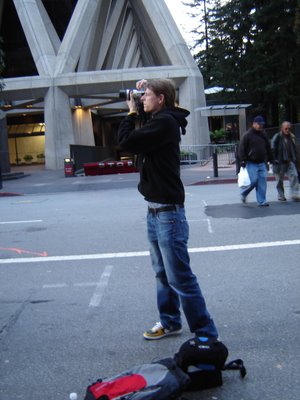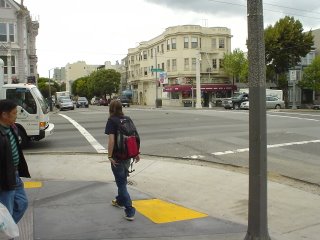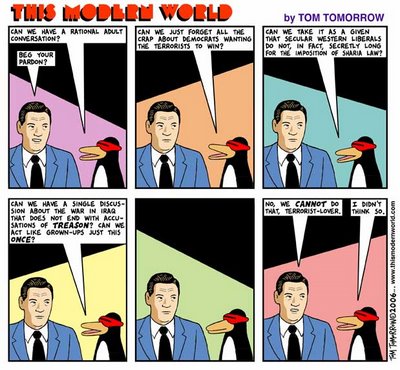Sunday, December 31, 2006
Wednesday, December 13, 2006
Anti-fair trade mit gutem Gewissen
Konkret werden drei Aspekte unserer derzeitigen Einkaufskultur kritisiert. Zum einen wäre da der Hang, "biologische" Produkte zu kaufen. Zum zweiten sollen die Produkte im Einkaufskorb am besten "zu fairen Bedingungen", also "fair trade", hergestellt sein. Schließlich wird auch Wert darauf gelegt, so "lokal wie möglich" einzukaufen, also am besten direkt vom Bauern am Rande der Stadt. Das klingt super und damit soll die Welt durch unser Kaufverhalten besser werden. Warum schreibt der "Economist" dann: "If you think you can save the planet by buying ethical food, think again"?
1. Probleme mit Bionahrung
Die Herstellung von "biologisch einwandfreier" Nahrung, also ohne Verwendung von Pestiziden usw. ist sehr "raumintensiv", dh es besteht schlicht nicht genug Platz, unsere gesamte Nahrung in dieser Weise herzustellen. Durch die Verwendung von Düngern etc. ist es möglich, das gleiche Stück Land ständig zu bewirtschaften. So ist es auch der "Green Revolution" aus den 1960er Jahren zu verdanken, dass zwar die Produktionsquote von Nahrung seit den 50ern verdreifacht wurde, dafür aber nur 10% mehr Landfläche vonnöten ist! Man kann auch sagen: wer bio-food kauft, unterstützt die Abholzung von Regenwald, weil irgendwo muss der Platz ja herkommen. Übrigens gibt es keine Studien darüber, dass Bioessen gesünder oder höherwertiger wäre, als konventionell hergestellte Nahrung, solange gewisse Regeln beachtet werden.
2. Probleme mit "Fair Trade"
Die Idee hinter "Fair Trade" ist folgende: Der Konsument ist bereit einen höheren Preis als den Marktpreis für ein Produkt zu bezahlen. Die Differenz kommt, theoretisch, direkt den Erzeugern zu Gute. Sie bekommen mehr Geld für die gleiche Arbeit, werden also "fairer" entlohnt. Der "Ungerechtigkeit der niedrigen Preise" soll so entgegengewirkt werden. Dahinter versteckt sich klassischer Protektionsimus, die Selbstregulierungsfunktion des Marktes wird ausgehebelt. Es ist einfach: Die Nachfrage bestimmt das Angebot und den Preis. Niedrige Preise sind Zeichen dafür, dass es schon zu viel von einem Produkt auf dem Markt gibt. Nehmen wir unsere Milchbauern und ihre "A Faire Milch", die es seit kurzem zu erstehen gibt. Würde man den Gesetzen des freien Marktes folgen, wären viele Milchbauern gezwungen, in andere, ertragreichere Bereiche als jener der Milchproduktion zu investieren. Durch die subventionierte Milch kommt dieses Signal nur ungenügend an, sie verharren in der Milchproduktion. Darüber hinaus werden andere Bauern animiert, noch mehr "Fair Trade" Milch zu produzieren, weil sich damit ja mehr Geld machen lässt, als eigentlich vorgesehen. Jene Bauern, die konventionell Milch erzeugen und die große Mehrheit darstellen, haben es dadurch noch schwerer. Sie verdienen weniger als zuvor, gleichzeitig wird der Vielfältigkeit ein Riegel vorgeschoben, da sich alle auf subventionierte Bereiche stürzen.
Dasselbe gilt für Kaffee: es ist nicht so einfach, als Produzent "Fair Trade" Status zu erlangen und so schauen zum Beispiel ausnahmslos alle Plantagenarbeiter durch die Finger. Kaffeeplantagen im großen Stil entsprechen nämlich nicht den Fair Trade Kriterien.
3. Probleme mit lokaler Produktion
Viele ehemalige Fair Trade Befürworter haben die Probleme erkannt und sagen: "Buying direct means producers get a fair price, with no middlemen adding big margins along the distribution chain." Außerdem muss die Nahrung nicht um die halbe Welt geliefert werden, man spart also an "food miles" (jener Weg, den ein Produkt von seiner Entstehung bis zum Endkonsumenten zurück legt). Das größte Problem liegt darin, festzustellen, wo denn ein Produkt am besten und umweltfreundlichsten hergestellt werden kann. Es ist klüger, Tomaten aus Spanien zu importieren als diese in einem britischen Gewächshaus über den Winter zu züchten. So verhält es sich mit vielen Produkten. Außerdem ist das Zuliefersystem der Supermärkte mittlerweile äußerst effizient. "Another surprising finding was that a shift towards a local food system, and away from a supermarket-based food system, with its central distribution depots, lean supply chains and big, full trucks, might actually increase the number of food-vehicle miles being travelled locally, because things would move around in a larger number of smaller, less efficiently packed vehicles."
Die Revolution durch Fair Trade - sie wird wohl nicht passieren.
Monday, November 27, 2006
long time no see...
ausserdem zerbreche ich mir gerade den kopf über mein thema für die bakk-arbeit. wird wohl etwas mit liberalismus zu tun haben. und legitimtiät der EU. ich rätsle nur, wie ich das am besten verbinden soll. der plan sieht vor mit der schreibarbeit mitte dezember zu beginnen und anfang märz mit allem fertig zu sein. ist schaffbar, denke ich. leider bin ich zur zeit sehr abgelenkt und es fällt mir schwer, mich zu konzentrieren. warum laufen nur ständig so gute serien im fernsehen?
Tuesday, November 14, 2006
Hegel died 175 years ago
Sunday, October 29, 2006
Sunday, October 15, 2006
Wednesday, October 04, 2006
it´s in our hands

no matter who the new austrian chancellor will be, I recommend him to read charles murray´s "in our hands". the book is a plan to replace the welfare state. sounds utopian? well, sooner or later we will have to face the problems created by our welfare system anyway.
charles murray´s short statement of the argument goes like this: "America´s population is wealthier than any in history. Every year, the American government redistributes more than a trillion dollars of that wealth to provide retirement, health care, and the alleviation of poverty. We still have millions of people without comfortable retirements, without adequate health care, and living in poverty. Only a government can spend so much money so ineffectually. The solution is to give the money to the people."
murray slates to give every american age 21 and older $10 000 a year for life. no other welfare measures would be available. the "plan", as he calls it, would be the end for social security, medicare and all other "income transfer programs". the result should be a prosperous society with poverty and unemployment reduced to the minimum.
I am not going to judge on the strengths and weaknesses of his proposal here - murray himself is aware that his plan is far from becoming implemented policy. but on the same token it is another good reminder of why it is important to keep our government from throwing money down the drain.
charles murray: "in our hands - a plan to replace the welfare state". AEI press. american enterprise institute for public policy research. washington, d.c. 2006.
Monday, October 02, 2006
der tag nach der wahl...
zum wahlergebnis habe ich den politologen franz fallend von der uni salzburg befragt. das interview kann man hier anhören.
außerdem war dendemann letzten freitag in salzburg. gut, das hat jetzt nicht unmittelbar was mit politik zu tun - trotzdem kam ein interessantes interview zustande, zu hören am 4. oktober ab 21.00 Uhr in der Radiofabrik. eine kleine geschichte gibt es auch.
zur wahl selbst kann ich mir einen kommentar wohl sparen. im oben genannten interview werden einige interessante aspekte aufgegriffen und nach X spezial zeit im bild und vorgezogenen reporten im orf, mit noch mehr interviews von noch mehr politologen, scheint erstmal alles gesagt zu sein. schwarz-grün kann ich mir jedenfalls an den hut stecken.
Sunday, October 01, 2006
der kurier gibt wahl-tipps
- Stocknüchtern, aber mit einem Doppler in der Hand die Bipa-Kundenkarte als Ausweis vorlegen.
- Vor Betreten der Wahlzelle neben dem Bleistift auch zwei Radiergummis verlangen.
- In der Wahlzelle laut und vernehmlich telefonieren: "Heast, is der BZÖ jetzt des mitn Strache?"
- Mehrfach wegen Fehlversuchen einen neuen Stimmzettel verlangen.
- Oder den leeren abgeben und sagen: "Ich muss mir´s noch überlegen, ich komm' morgen wieder."
- Sich in der Wahlzelle entkleiden und das Gewand wie über einen Paravent werfen.
- Wahlbeisitzer und Wähler mit dem Handy fotografieren.
- Bitterlich weinend den Wahlzettel vor dem Einwerfen in die Urne in kleine Stücke zerreissen.
Danke Kurier, lange nicht mehr so gelacht. Leider war ich zu feig, um einen der Vorschläge auch auszuprobieren.
Wednesday, September 27, 2006
what do swedes think? (2)
mans ramberg from vaxjo has something to say:
"I voted for the center party for a number of reasons. A) They are proposing big changes in the current system of labor laws for the young, which will hopefully make for a more flexible labor market for people my age. B) They have the most consistent EU-policy in my eyes, with exciting ideas about federalism and restructuring of that old dragon. This is true about their ideas for the swedish system as well. Under the new government we can hopefully see the abolishment of such silly ideas as the pharmacy monopoly and other remnants of the social democratic centralistic state. C)They are the most honest of the right wing parties of today. They are consistent in most of their questions and do not follow populist tracks as so many of their co-operators as well as opponents.
There are more reasons, but I would say those are my top ones. When it comes to the election in general, I must say that I am very torn personally. My friend Henrik who is an electrician commented on the election night: "It's a dark day for the swedish workers". To hear that and then see brat-kids from the rights youth movements dance on the street leaves me wondering where I really stand. I do hope and wish that the policies that I vote for will be for the benefit of the weaker in society, but I wonder if my elected politicans think the same. I am feeling the class dimension more than ever.
One thing that worries me a lot is the relative good result for the xenophobic party Sverigedemokraterna in different parts of Sweden. I was hoping that they would never grow above 1 percent, and the current situation tells a lot about the undercurrents and tensions thet has been hidden for a number of yaers but now seem ready to show their ugly face."
Tuesday, September 26, 2006
home sweet dome
"The Saints put the icing on the cake Monday night, and it sure was sweet. In the days leading up to their emotional return to the Louisiana Superdome, veteran wide receiver Joe Horn said that the game would be a win for the city and people of New Orleans whether or not the Saints came out on top against the Atlanta Falcons but they wanted to put the icing on the cake by beating their NFC South rivals and running their record to 3-0."
word up, go saints!
Sunday, September 24, 2006
the road race
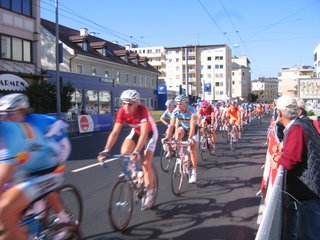
last day of the uci road worldchampionships 2006 in salzburg. the road race takes place, more impressions after the jump.
continue
Thursday, September 21, 2006
uci road worldchampionships in salzburg
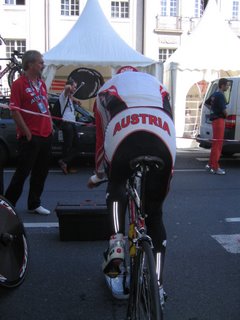
road cycling is big in my hometown these days, here are some random impressions from today´s single time trial. 51 kilometers through salzburg and its outskirts.
continue
Wednesday, September 20, 2006
what do swedes think?
sara ardic from norrköping is the one to start:
"I think a lot of people voted for the right simply cause they want a change for the country, not necessarily cause they're so unhappy with the state of the country. We've had the same part governing the counntry for a long time. Alo, the right have tried to change their image into the new working class party.... we'll see about that.
I voted for the socialdemocrats simply cause I feel they're more in the line with my values - that everyone should be taken care of. I'm both curious about what will happen with the new government, have to admit it is a bit exciting , but I have to say I´m a bit nervous too."
Tuesday, September 19, 2006
it changes...
"At last Göran Persson has resigned. And the mood on Stockholm´s streets (where the social democrats have collapsed) is a little more open and free. When I took the bus earlier today the bus driver didn´t charge me and just waived me through with a big smile."
unfortunately, bus drivers are not celebrating by giving passengers a lift for free:
"Woops. I thought that the bus driver waived me through because he was happy with the election result. Imagine my double disappointment when I realised that this was because of a bus robbery on Sunday that made bus drivers afraid of handling cash..."
well. easy coming, easy going.
wahlkabine

ginge man nach diesen ergebnis, würde es für mich wohl sinn machen "taktisch" zu wählen, um schwarz-grün eher zu ermöglichen. mangels einer liberalen alternative ist das wohl das kleinste übel.
Sunday, September 17, 2006
chuck close

us update for september
university of alska fairbanks (first choice)
western washington university
portland state university
Thursday, September 14, 2006
schweden wählt am sonntag
viele schweden sind aber nach wie vor der meinung, dass ihr modell des wohlfahrtstaats die anforderungen der nächsten jahrzehnte nicht mehr bewältigen kann. somit kann diese wahl richtungsweisend sein - und die liberale alternative möglicherweise doch noch zu ihrem erfolg kommen.
Wednesday, September 13, 2006
wahlkonfrontation
DIE SCHULBEUTEL SIND ZU TEUER!
das ist zwar nicht viel, aber auch nicht nichts, wie ich finde...
Monday, September 04, 2006
bündnis
Tuesday, August 08, 2006
12 is the magic number (?)
or let me put it like this...twelve OR five is the magic number. so, I chose option 3 (just read the previous entry) which means that I am going to stick around in austria for a while. I cancelled my flight to portland and I have to admit it still hurts a bit. but I am trying to get on track (or stay on track) with my us grad school plans. more updates on that within the next weeks, big promise. and if it´s not working out I am back at wu, fast as a lightbolt. oh, and I got an internship at a small radiostation in salzburg starting on the 11th of september - I need that for my bachelor´s degree. I am already hosting a show with some friends, but since this has nothing to do with politics it´s not counting.
alrighty, that´s it for now. have a nice week!
Tuesday, August 01, 2006
us updates
- returning to salem on august 21st. advantages: great place and responsible for the best year of my life. disadvantages: not enough time to plan everything out the way I want it to.
- getting my bachelor´s degree in salzburg and applying for grad school in the states for august 2007. advantages: enough time for planning, would be easier (financially speaking). disadvantages: I have to stay in austria for 12 long months. what if I don´t get my bachelor´s during that time (well, that should be no problem) or if I am not being accepted for grad school?
- postpone my return to salem until january 2007. advantages: I can see where my salzburg bachelor´s/US grad school plans take me. if there are too many things going wrong I can always return to the states, getting my bachelor´s there and see what happens. disadvantages: can´t think of any, right now. so this is what I am going to do, as it looks like.
Sunday, July 30, 2006
"one day you return to the warmth of leaving home"
Sunday, June 25, 2006
die wm berichterstattung...
Friday, June 09, 2006
congratulations ecuador!!!

wow, I was hoping for them to do a good job and ecuador did not disappoint me. two-nil against poland, due to maintaining their discipline against a team that seems to have troubles being a team. let´s wait and see what else group a is going to reveal. oh, and I think susy, gabbycita and javier are going to party now - greetings to you, guys!
tomorrow's matches:
group b/group c:
england - paraguay
trinidad/tobago - sweden
argentina - ivory coast
today:
group a:
germany - costa rica 4:2
poland - ecuador 0:2
ranking:
1. germany
2. ecuador
(pic: reuters)
Ecuador : Polen
Und da ist es auch schon vorbei, die erste Partie der Fußballweltmeisterschaft, das Eröffnungsspiel, Deutschland gegen Costa Rica, 4:2, also sechs Tore, ein Feuerwerk, und das ungefähr ein halbes Jahr vor Ende der Semesterferien. Über diesen Zufall spricht aber niemand, nein, es lässt sich gut an, die WM für die Weltgastgeber und alles was zählt ist die Begeisterung, auch wenn Paulo Wanchope kein Ronaldinho ist – aber genau das herauszufinden wird den Deutschen nicht erspart bleiben.
Und jetzt spielt Ecuador, und wenn sie es gut machen, dann spielen sie nicht, nein, dann zelebrieren sie Fussball, ja ist ihnen das denn zuzutrauen, wer weiß das schon, und es wird die Welle der Begeisterung hineingetragen in die Tiefe des lateinamerikanischen Raums. Und nicht nur das, auch in die Höhe, in die Höhe von Quito, der Hauptstadt der Gelb-Blau-Roten, die mit Polen zwar einen schweren aber doch bezwingbaren Gegner in der Gruppe A vorfinden – von Deutschland wissen die Ecuadorianer ja, das letzteres leider nicht zutreffen kann.
Costa Rica machte den Anfang, jetzt Ecuador, morgen geht es ganz in den Süden nach Argentinien, auch Trinidad und Tobago und Paraguay werden sich die Ehre geben – dann fehlen noch Brasilien und Mexiko und mit den USA werden dann die Amerikas, alle die es gibt!, erste Duftmarken gesetzt haben, die weitere Ausblicke erlauben.
Vorerst möchte ich aber nicht weiter eure Zeit stehlen - schließlich spielt ja Polen und der Anstand müsste mir eigentlich solche Wortspiele verbieten. Einundzwanzig Uhr, Anpfiff.
let´s get it started!

"the celebrating faces of football", as the smileys in the world cup logo are called, finally can start to celebrate. and even though they are more looking like the celebrating faces of people who abuse alcohol, I can´t wait for the kick off. in 75 minutes from now everything is going to be good.
today´s matches: germany - costa rica and poland - ecuador. hooray for latin america, I hope we experience two surprises this evening.
"vivan siempre el trabajo y la paz" is the motto of the republic of costa rica - the first nation to constitutionally abolish its army, by the way.
alright then, costa rica: trabaja un poco and make the germans cry. wishful thinking? let's see.
Saturday, June 03, 2006
question of the day
Thursday, June 01, 2006
studying abroad
Sunday, May 28, 2006
Sunday, May 14, 2006
silver creek falls

today tara, swedish sara, laure, everett and I went to the silver creek falls, one of the most beautiful places in oregon. ev and I went for a nice run and this maniac even dived into the ice cold water. more pictures right after the jump.
continue
Wednesday, May 10, 2006
stick a fork in me, I´m done.
here´s a list of the classes I took this year:
pol 305 Modern Political Theory
pol 315 Capitalism and Democracy
pol 315 Politics of Citizenship and Immigration
pol 326w Globalization and Equity
span 132 Elementary Spanish II
span 231 Intermediate Spanish I
and as if that was not enough, I worked for Campus Safety. It gets even better, I got a free coffee from the bistro once because I was a campus tourguide for some german highschool kids.
if that´s not studiousness, what else is? haha...
Sunday, May 07, 2006
7 days
Wednesday, May 03, 2006
beautiful oregon

crater lake/oregon. this picture was taken by mike miller and can also be found on monty´s blog - a blog that´s worth reading, by the way.
Monday, May 01, 2006
von friedman zu friedman und warum teures öl kein grund zum jubeln ist.

ich kann mich auch täuschen, aber ich denke ich bin dieses jahr zeuge eines "großen umdenkens der us amerikaner", welches ansatzweise bereits früchte trägt. man braucht nicht lange zu suchen um in tageszeitungen berichte und analysen zum thema "global warming" und "sustainability" zu finden.
nun, es mangelt nicht an energieverschwendung, da hat man in europa diesbezüglich schon ein ziemlich realistisches us-bild.
allgemein ist man aber der ansicht, dass die hohen erdölpreise, die sich in letzter zeit so zwischen $40-60 (heute: fast $72) pro barrel bewegen und mittelfristig eher steigen als fallen werden, zu einem schrittweisen umdenken der us-bevölkerung führen. natürlich ist es für die leute hier kein argument, dass us-benzin (diesel ist übrigens nicht weit verbreitet) im vergleich zu anderen ländern immer noch billig ist - was zählt ist, dass einmal volltanken heute mehr kostet als vor einem jahr oder vor 10 jahren. das, gepaart mit der fehlenden aussicht auf niedrigere preise, lässt immer mehr menschen von benzinfressenden SUVs zu deutlich rentableren hybrid autos wechseln. so zählt toyotas prius bereits zu den beliebesten autos in den vereinigten staaten.
all das ist nicht wirklich neu (für nicht-us-amerikaner) oder überraschend. für viele umweltbewusste menschen sind die hohen rohölpreise ein willkommenes zeichen für die anstehende wende hin zu einem nachhaltigeren umgang mit umwelt und ressourcen. einiges spricht für diese auffassung - jedoch ist der wahre preis den wir für teures öl bezahlen weit höher als die zapfsäule an der tankstelle anzeigt.
foreign policy hat in seiner mai/juni 2006 ausgabe einen artikel von"New York Times" kolumnist thomas l. friedman veröffentlicht, der den zusammenhang zwischen steigenden erdölpreisen und sinkender demokratiemoral in erdöl exportierenden ländern aufzeigt. was friedman als "The First Law of Petropolitics" bezeichnet sieht folgendermaßen aus:
"The First Law of Petropolitics posits the following: The price of oil and the pace of freedom always move in opposite directions in oil-rich petrolist states. According to the First Law of Petropolitics, the higher the average global crude oil price rises, the more free speech, free press, free and fair elections, an independent judiciary, the rule of law, and independent political parties eroded."
was führt zu dieser entwicklung? staaten wie venezuela, azerbaijan, ägypten und russland profitieren immens von hohen erdölpreisen, da nahezu alle staatsausgaben mittels einahmen aus dem erdölverkauf gedeckt werden. solche staaten können es sich leisten, ihrer bevölkerung kaum steuern aufzuerlegen. und nicht nur das, wie hugo chávez in venezuela zeigt: mit massiven, auf kurzfristigen erfolg ausgelegten wohlfahrtsprogrammen wird die bevölkerung milde gestimmt. man nimmt ihr sozusagen den wind aus den segeln um politischen widerstand gar nicht erst aufkeimen zu lassen.
friedman schreibt: "A massive influx of oil wealth can diminish social pressures for occupational specialization, urbanization, and the securing of higher levels of education - trends that normally accompany broad economic development and that also produce a public that is more articulate, better able to organize, bargain, and communicate, and endowed with economic power centers of its own."
so ermöglichen hohe ölpreise ungestrafte ausfälle wie jene ahmadinejads, welcher den holocaust als "mythos" bezeichnet oder, nicht ganz so krass, chávez´, der tony blair ein unhöfliches "go right to hell" ausrichten lässt. was haben diese staaten zu befürchten? vorerst einmal nichts - mit gefüllten staatskassen und einer unterdrückten bevölkerung auf die die regierung nicht angewiesen ist muss man sich nicht um korrekte umgangsformen scheren. was hat die westliche welt zu befürchten? einiges: "When you have enough countries with enough negative impacts, you start to poison global politics."
und das ist das dilemma: höhere energiepreise sind offenbar von nöten um menschen in westlichen industrienationen zum umdenken richtung nachhaltigem umgang mit der umwelt zu bewegen. würde treibstoff nicht teurer, könnten wir bald auf schlauchboote umsteigen - reisserisch ausgedrückt. zur gleichen zeit führen höhere ölpreise aber in einer vielzahl von staaten zur unterdrückung der bevölkerung und zu außenpolitischer "diplomatie" die nicht gerade auf ein künftiges stabiles staatenzusammensein hoffen lässt.
wir müssen auf alternative energien umsteigen um der abhängigkeit von öl endlich ein ende zu bereiten. sinkt die nachfrage nach öl, wird sich auch das verhalten der jetzt übermütigen erdöl exporteure ändern. friedman nennt ein beispiel: "With all due respect to Ronald Reagan, I do not believe he brought down the Soviet Union. There were obviously many factors, but the collapse in global oil prices around the late 1980s and early 1990s surely played a key role."
es muss uns also gelingen den preis für öl zu drücken - und zwar nicht durch die erhöhung der fördermenge (was ohnehin nicht mehr lange möglich ist, der oil-peak [mehr als die hälfte allen vorhandenen erdöls wurde gefördert] wurde vor kurzem erreicht) sondern durch den umstieg auf andere energiequellen. demokratischer fortschritt in einer vielzahl von staaten wäre die folge. der hervorragende nebeneffekt: eine deutliche reduzierung der co2 emissionen. nur, zumindest letzteres wissen wir seit mehr als 30 jahren und es hat nichts genützt - aber was bleibt uns anderes über als ein neuer anlauf?
(foto: windkraftanlage in dänemark, von wikipedia)
Sunday, April 30, 2006
nice quote
Saturday, April 29, 2006
stick to the rules...
"Dear Rudy,
It has come to my attention from RA ---- ---- that you were at a gathering of more than 20 people in UAP 401 on April 22, 2006. The Standards of Conduct that were violated were:
a. Any gathering in an individual student room where alcohol is present may not exceed a safe and manageable occupancy for that room. The University defines "safe and manageable occupancy" as no more than three (3) times the residential occupancy for that room (page 30, /Selected Policies Manual/).
18. Disorderly conduct (including disorderliness resulting from intoxication), unreasonable noise or behavior which results in material inconvenience, annoyance or alarm (page 15, /Selected Policies Manual/)
Since your interaction was cooperative and your involvement was minor, there is no need for a formal administrative hearing. This letter serves as your formal warning.
Rudy, I would like to remind you that need to be aware our policies in the Selected Policies Manual. Feel free to contact me at
Sincerely,
----
--
---- ----
Eastside Area Coordinator
Willamette University
900 State Street
Salem, OR 97301
(503) 370- ---- "
yeah, whatever. hmm...of course, I take the warning seriously, so this is my reply:
"
thanks for your e-mail. it is true, I was at the gathering and there was alcohol involved as well. I just want you to know that this gathering was somehow "relaxed" which means: people were listening to music, some (including me) were sipping beer. this was NOT a drinking competition or anything like that. I am older than 21 but I was aware that there were minors in the room. at that moment I did not think that I was doing anything wrong. I know about the rules though and I am not going to violate them again.
have a nice weekend!
rudy "
plus: freedom is my anti-gov. thank you.
(may 3rd, 2006: I decided to censor the names. not because someone told me to but because I think it´s polite.)
Thursday, April 27, 2006
dealing with friedman (2) - thoughts on the welfare state
To Friedman the redistribution of income through the state is not desirable. It widens the gap between the poor and the rich – and that is the opposite of the original intention of the welfare state. Incompatible with ones freedom to pursuit happiness individually, a positive attitude towards governmental influence in favour of the hapless is to Friedman like believing in “dictatorship, benevolent and maybe majoritarian, but dictatorship none the less.”
Welfare measures such as public housing, minimum wage laws, farm price supports and social security have counter-productive effects. Friedman’s main concern is that the original needs for implementing those measures cannot be satisfied – but once the government takes control over the issue the borders blur and state intervention increases. One example is the need for restrictions on import once you start guaranteeing high prices for farm products and high wages for farmers. The vicious cycle then goes on with individuals being left with fewer choices, fewer companies, higher chances of monopolization and the like. It is simply that “one cannot be both an egalitarian, in this sense, and a liberal.”
Gerald Allen Cohen, author of “Karl Marx's Theory of History: A Defense (1978, 2000)“ must get in rage every time he is confronted with Friedman. The existing inequalities he is commenting on have not much to do with Friedman’s version of a nation state that is built on the principles of equal opportunities and rights. Devoted to egalitarian political principles Cohen objects the “misuse” of the “concept of freedom” by libertarians and liberals. He is accusing them of having “highly anarchic imaginations” if they are advocating, and Cohen quotes Flew, “wholehearted political and economic liberalism, opposed to any social and legal constraints on individual freedom”. But this is not Friedman. “My freedom to move my fist must be limited by the proximity of your chin” can be read in his book. Friedman thinks that in order to reduce poverty a program much more effective than government welfare, a program that aims directly at poor people (not old, unemployed… etc), should be implemented, a program based on a negative income tax. Therefore households with higher income would have to pay more taxes, low income households would receive payments, financed by those taxes. People would receive cash, Friedman thinks that’s most effective to save personal freedom. So, there IS awareness for the problem and possible solutions are presented. Cohen’s assumption that liberalism automatically means to create a sphere where all individuals are literally free to do what they want is wrong. Friedman knows that and concentrates on finding the thin lines between acceptable interference by the state and abuse of power. And when Cohen points out that “a capitalist society with no welfare structure would endanger the very lives of those who…are unemployed”, Friedman would argue that the free individual is free to give money to the poor – and in a realm of existing civil liberties everybody is free to convince other people that they should do so. So, liberalism is not automatically opposed to a caring society even though this is a somehow naïve expectation. It would be perfectly possible to give shelter and food to all homeless people in the
But for Cohen, all of Friedman’s arguments rest on an unjust foundation anyway. Contradictive to natural rights, the allowance of “private ownership of means of existence” through the market is out of the question.
Wednesday, April 26, 2006
come on! you can´t study ALL the time...
Tuesday, April 25, 2006
dealing with friedman (1)
What do libertarians (or liberals in a Friedman kind of sense) have to say about social objections related to capitalism, such as racial discrimination or poverty? Milton Friedman deeply believes that a true free market would be able to cope with those objections – for they have their roots in state interference.
Seeing human beings as economic units without characteristics such as color of skin or religion, Friedman argues for the rules of the market to let inequalities disappear. State intervention in form of “pro-integration” or “right-to-work” programs implemented by orders from above do actually harm to minorities – and not just to them but to the whole population. The undermining of the main concern of the free market – the “freedom of individuals to enter into voluntary contracts with one another” (Friedman) – is in large parts not acceptable for Friedman. His normative approach is comprehensible, maybe even essential for his purposes. Friedman plots a perfect capitalist system created by people who understand and appreciate this system. He assumes vital participation, everyone seeing himself as an “economic rational choice actor”. So it is understandable that he assumes that the poor lower class family in a bad neighbourhood has access to (or is willing to access) the information needed in order to understand why privatized schools are better than nationalized ones and how they have to act to share in the advantages. Once people would share Friedman´s views, the “invisible hand” could take care of social and cultural issues as well.
Adam Przeworski cites Stiglitz saying: “Adam Smith´s invisible hand may be more like the Emperor´s new clothes: invisible because it is not there.”
And Przeworski also points out that the neo-liberal promotion of the free market is nothing but “a mixture of evidence, argument from first principles, self-interest, and wishful thinking”. Partly because a “complete set of markets is unfeasible” and “information is inevitably imperfect.” Again, Friedman´s perception reflects a normative rather then a descriptive point of view of the free market. Friedman would not disagree that the present system is far from being “perfect” but he calls for the state to beat a hasty retreat.
For Przeworski it is by no means clear that the reduction of state influence automatically leads to a situation that is more desirable. Even though he admits that there are problems of institutional design he would rather rearrange them than to shut them down. Adapted to the role of government in education it would mean that governmental institutions should not be released from coordinating funds just because the liberal point of view does not guarantee improvement. So if Friedman says that the liberalization of the education sector would elevate school standards because more competition leads to more choices and furthermore to a more just allocation of opportunities, Przeworski could jump in and say: Wait, there is evidence that the drawback of the state leads to unemployment, to a decline in the real income and to more people living below the poverty line. Besides that we know that “complete information” is not available so it is more likely to get a system where people, who today depend on governmental subsidy to be able to attend university, would be in no position to join any university. Furthermore it would not do any good to the reduction of social problems such as discrimination.
It is a struggle between two big schools of thought and both have their virtues. And even though neo-liberalism has its roots, among others, in Friedman, there is still a lot of potential when it comes to the implementation of his ideas.
Milton Friedman: "Capitalism and Freedom". The University of Chicago Press. 2002. (first published 1962).
Adam Przeworski: "The Neoliberal Fallacy" in Diamond and Plattner's "Capitalism, Socialism and Democracy Revisited". The John Hopkins University Press. 1993.
Saturday, April 22, 2006
alphabeat...wer beatet mehr?
 if you have time...check it out: alphabeat. a radioshow I am doing with a bunch of friends from salzburg and vienna. it´s in german so you can actually improve your language skills. that´s pretty awesome, right?
if you have time...check it out: alphabeat. a radioshow I am doing with a bunch of friends from salzburg and vienna. it´s in german so you can actually improve your language skills. that´s pretty awesome, right?
Wednesday, April 19, 2006
george orwell sagt hallo
Tuesday, April 18, 2006
doing my taxes, part II
while I am struggling with all this, I am deeply into milton friedman´s "capitalism and freedom". he talks about taxes a lot and he basically does not like them either.
call me homer...
well, I assume they won´t send me to jail. but us government, if you are already trying to track me down and if you are reading this: I earned one hundred bucks while I was working for campus safety last december. send me an e-mail so we can exchange banking information.
I love blogs! they are really convenient for everyday life.
Wednesday, April 12, 2006
attention please! websites for the open minded (3)
it is all about checks and balances.
--- --- --- --- --- --- --- --- ---
oh, and for people who think that illegal immigrants in the US are really really bad and dangerous and what not, read this and think again. keep in mind though that this article is not addressing the ethical aspects of hiring illegal immigrants...the question of how to achieve a sustainable development of a domestic economy that is to some extent independent of exploitation and inequalities is a different one.
--- --- --- --- --- --- --- --- ---
the following link can also be found on johannorberg.net. once more, the topic is freedom of speech.
Monday, April 10, 2006
american apparel - a company on a mission
Friday, April 07, 2006
"our government has let us down!" - an evening with joe wilson

now it takes some background information, one can start here for example, to enjoy what I call "the joe wilson show". needless to say, with all his (diplomatic) experience it is hard to find a speaker more eloquent than joe wilson. willamette students and salem townspeople had the pleasure to be witnesses of what it means to "live" freedom of speech.
"Did the Bush administration manipulate intelligence about Saddam Hussein's weapons programs to justify an invasion of Iraq?
Based on my experience with the administration in the months leading up to the war, I have little choice but to conclude that some of the intelligence related to Iraq's nuclear weapons program was twisted to exaggerate the Iraqi threat."
accusing the us-government of starting war in iraq under false pretenses, wilson´s article "what I didn´t find in africa" (first published by "the new york times" in july 2003) brought him into trouble. his wife´s identity as a cia-agent got revealed in an article by columnist robert novak. since this act of treason, "valerie plame" is a name well known in the united states. anyhow, the traitors have not been called to account for their felony yet. and just click on the novak link to get an idea of the variety of persons involved in this scandal.
for wilson, one thing is clear: the government wanted his wife´s identity to be revealed because of three main reasons: to change the subject towards something more advantageous for the government, pure revenge for not supporting the war in iraq and, most important, to make an example of him. the ordinary us-citizens should know that if they did the same to the government than joe wilson, then the government would do to the citizens what it did to joe wilson and his wife.
so wilson sees it as his mission to speak up against such injustice. "you must hold our government to account". the united states depends on the vigilance of the citizens for its success. in his eyes, the bush administration lied and twisted intelligence to get support for a war that should not have been fought under these circumstances.
it´s his word against the governments. and, as always, one has to be very cautious to take every word that´s said for granted. but joe wilson shows that public dispute is far from being dead in the states. and climbing onto a podium and expressing ones believes is by itself an act essential to every vital democracy.
(the picture shows joe wilson and is taken from "willamette week online")
oh, before I forget: today (friday) "maria full of grace" is shown in smith at 8pm. great movie, so watch it!
ein beispiel warum es sinn macht...
Wednesday, April 05, 2006
can we make "globalization" more just?
„If the citizens don’t have any other options to react, then you have to take over responsibility and go beyond legality. Conscience is more important then obedience before the law.” José Bové
This blog entry will take focus on the unbalanced aspects of globalization and how its critics can help to make globalization more just by restructuring their resistance away from an unclear and somewhat confusing protest towards an organized and determined way of calling attention to the disadvantages of today’s globalization.
The term “globalization” is elusive and at the same time the initial point of various controversies. The “globe” in globalization implies that we are facing a mundane development. It does not suppose that there actually IS a “world system” but it does suppose that there is the possibility that this movement leads to a “world state” with its own “world culture”. However, first and foremost one thinks of globalization as the globalization of markets – and with it, the globalization of cultural and social values and behaviour patterns is bound to occur. The creations of international markets, legal systems, actors (or “players”), norms and standards have one thing in common: they exceed national borders. Anthony Giddens defines globalization as an increase of interdependences all over the world.
“Globalization can thus be defined as the intensification of worldwide social relations which link distant localities in such a way that local happenings are shaped by events occurring many miles away and vice versa.” (Giddens in Held and McGrew 2004, 60)
Furthermore Giddens argues that even though local happenings may have had impact on other parts of the world in earlier times, today’s interdependences have a whole new quality. Even though globalization is seen as the successor of ethnocentrism, it seems to be the western, industrialized world that influences its development the most. Terms like “Westernization” or “McDonaldization” are sometimes used as synonyms for globalization (see Jan Art Scholte in Held and McGrew 2004, 85). Indeed, as Joseph Nye points out, the three main hubs of globalization are the
Additionally, the discussions about globalization are discussions about a new world order; a world order that remains very confusing. Old national regulations seem to be out-dated and inefficient to face increasing deterritorialization (think of the resettlements of corporations and/or unemployment) - this leads to the demand of a new system of ordering.
I am arguing that the political neo-liberal right of wealthy western industrialized countries is shaping this new system of ordering by influencing the way globalization goes - and it does so with hardly any consideration towards the weak. An African Proverb says that when two elephants are fighting, it is the grass that suffers. As the story goes, if two elephants are making love, it is also the grass that gets trampled .
Examples that verify this strong picture could be trade liberalization policies, which are pushed through on behalf of developing countries. One can blame the establishment of different institutions after WWII (like the GATT/WTO, the IMF, the World Bank) for this course of action. More evidence is provided when, like in the early 1980´s, politicians like
The French refer to people who are critical towards globalization as “altermondialistes”. This term includes both the earth and the alternative. Therefore I consider it more appropriate than the term “anti-globalist” since this is a somewhat radical, utopian conception for a movement that is partly deeply rooted in the capitalist system of western industrialized countries. “Another world is possible” is a common alter-globalist slogan, among others used at the first World Social Forum in
Nowadays the alter-globalization movement experiences presentable reception. A vast number of non-profit organizations have called to speak up against globalization – sometimes without giving answers to what should be “fought” exactly and why. The great diversity within the alter-globalization movement is basically positive but it leads to stagnant decision-making and negotiation processes. It seems like everybody walks under the umbrella of “alter-globalization” – but occasionally it’s a silly walk, back and forth, left and right. It’s difficult enough not to fall over one’s own accord although it would be so important to gain pace in order to improve the globalized world according to alter-globalist´s ideals. And gaining pace is what the “enemy” does. Tight organization and treaties that tie it’s signers to certain conditions enable institutions like the WTO to move on while it’s opponents have a hard time to channel their disfavour to constructive paths.
An apposite example is the “Battle of Seattle”, the huge demonstration of anti-globalists, alter-globalists and anarchists against the WTO summit in the
There is a need for a powerful and efficient organization that is able to accumulate and channel the concerns of alter-globalists so they can actually find their way to the agenda setters.
How can such an organization look like?
It might be surprising that I recommend an institution that has a structure similar to that of the WTO. The World Trade Organization is a member driven organization. To be allowed to apply, one has to be a nation state. According to its website, the WTO now has 149 members. As a matter of fact, the number of alter-globalist groups is much higher than that and it is clear that there has to be a restriction to a certain number of members in order to remain powerful. A possible solution for this problem may be the possibility for each state to send one delegation to the yet fictitious institution. This delegation is not linked to the government and the number of delegates is related to the population. Similar mechanisms for a population-based participation are seen at the European Parliament for example. The advantages of this allocation-method are indicatory: First it is set against existing power structures (for example the economic domination of western industrialized countries) and therefore helps aggrieved countries with large populations to increase their participation in the alter-globalist process. From experience, many of those countries are to be found both on the Latin American and on the African continent. Second, taking the number of citizens as an indicator is an incorruptible and comprehensible approach. Furthermore, each delegation should have various committees to be able to cope with a heavy workload. Three problems are yet unsolved: The composition of each delegation (which organizations and groups are allowed to send advocates), its performance requirements (which policies should be pursued once the delegation is built-up) and the financing.
The selection procedure for the delegates may differ from state to state and considering the great diversity that exists, it is probably a problematic procedure. Since by today the national movements are still the ones most influential, it is possible that the different organizations benefit from structures that are already built on the national level. In the early stage it is predictable that there are a notable number of organizations not included in the process. The election-methods can be chosen by each state and the disadvantage of not being able to participate in the first place does not mean that these organizations or individuals are not allowed to bring their concerns and ideas into the debate. Once the delegation is arranged it is sent to the permanent Alter Globalists Organization’s (AGO) headquarters, based in any city. There, the real process of policy making starts. At first, delegations have to sign a treaty that makes them stick to the rules. It might be a crucial point for alter-globalists to finally step into this bureaucratic system. As in the WTO, those summits can take place every two years and different fields of activity are to be offered. The delegations split up and each delegate chooses the field he thinks he is able to represent the most (for example environmental concerns, concerns about working conditions [“sweatshops”], etc.) The number of committees might vary from summit to summit and each committee has to agree on just one agenda to be followed for each summit. Thinking of the vast number of possible topics it is important to set priorities. I suggest that for the topic’s electoral process simple majority should be used. If the topic is chosen it is the delegate’s duty to address the main problems and to agree on a policy that could solve those problems. With these policies, delegates return to their home alter-globalist organizations, requiring them to assemble those policies.
According to this theory it is possible to put pressure on the government without weakening oneself because of contrary lines of action. Being able to present a clear policy that needs to be followed makes it more convenient to convince citizens of the ideas – and once support increases it will be impossible for governments and corporations to ignore this development. Furthermore the significance of influence is likely to expand from the regional and national level to the continental and even international level. The smaller the group and the lower the level, the more radical seems to be the protest. José Bové and his French organization “Confederation Paysanne” show, that protest with extraordinary means is important up to a certain point. Then, communication of interests has to reach a diplomatic quality that makes it possible to negotiate.
To finance this institution, fundraising will be inevitable. As the example of Greenpeace shows, it is possible to run a large apparatus. Pure idealists might even argue that once there is a tax on all trade of currency (“Tobin tax”; see Robert E. Goodin, 2003) it would be appropriate to spend some of this money on an Alter Globalist Organization.
It is going to be a long and rocky road until an organization like the one described above really is able to exist and there might lurk some unforeseeable problems. And, gatherings and discussion-forums like the World Social Forum are not going to be replaced; they have their significance in the alter-globalist movement. However, it is important to start building the institutional framework of an Alter Globalist Organization for it may help to avert stagnation and it may help to bring well structured concepts of how the globalized world should look like into play.
the graphic shows the wto-structures
books used: held and mcgrew; steger; goodin. if you are interested in the detailed bibliography, feel free to contact me.

Tuesday, April 04, 2006
attention please! websites for the open minded (2)
to subscribe to their free press releases, send an e-mail to coha@coha.org with "subscribe" as the subject.
attention please! websites for the open minded (1)
Monday, April 03, 2006
paying a visit to alcatraz





just take a quick look at the pictures above and you get the idea of what it´s like to wander around alcatraz island these days. tourists everywhere - and you can buy t-shirts and dvd´s on almost every single corner. "the rock" with nicolas cage and sean connery for 23 bucks - now that´s what I call a bargain! nevertheless, the former state penitentiary is worth a visit. kept in service from august 1934 until march 21st, 1963 it provided food and shelter for villains such as al capone and robert "the birdman" stroud. needless to say, the cells were small and the food was bad (if you plan to go to alcatraz one day I encourage you to pay 5 dollars more for the audio tour - some hilarious anecdotes are waiting for you). and hey, that´s about it. it´s a prison and not disneyland so what do you expect? but there´s more. abandoned after 1963 the buildings on the island began to decay. while the government was not sure what to do with it, alcatraz was considerd to be either a casino, a shopping mall or the ground of a west coast version of the statue of liberty. but before it eventually became part of the golden gate national recreation area and got opened for puplic in 1973, alcatraz was birthplace for a vital native american movement, the United Indians of All Tribes Foundation (UIATF). Indians in San Francisco Bay area started an attempt to occupy the island and to assert their claims for the creation of a native american cultural center on alcatraz. similiar actions were taken in and around seattle at that time. against the background of the vietnam war, us citizens and the media paid a lot of attention to this civil rights movement and it was not until late 1970, 18 months after the "invasion", that the UIATF left alcatraz. even though the island itself was not converted into a cultural center, the native american movement was able to enforce other important institutions. for example, the "daybreak star center" in seattle "became a nucleus of activity for the local and regional Indian community", see www.unitedindians.com.
this is just one example of how an ordinary tourist attraction can offer more than just a quick pleasure of sensation. oh, and I am sure that even the golden gate bridge hides some interesting stories - but I don´t know any and so it´s just some boring red bridge with lots of traffic to me...
(thanks to dominik for the pictures).
Friday, March 31, 2006
san francisco museum of modern art (day 5)
egal, heute gab es keine probleme. besonders beeindruckt war ich von xefirotarch. hier die offizielle homepage.
das groesste problem an so stadtreisen ist ja, dass man ohnehin schon voellig reizueberflutet ist - auch wenn man nur ganz gemuetlich durch die strassen schlendert. da bedeutet so ein museum natuerlich den absoluten overkill. also werde ich erstmal eine runde schlafen...
nachtrag zu gestern: touristenprogramm: golden gate bridge und alcatraz. zu letzterem folgt ein blog - aber erst wenn ich wieder in salem bin.
Thursday, March 30, 2006
Tuesday, March 28, 2006
san francisco (day 2)
Monday, March 27, 2006
first day in san francisco


verena, susi, dominik and I arrived in san francisco after a long train trip (18+ hours). everything seems to be great so far but all of us are really tired. just 2 pics to make you jealous... the connection is incredibly slow so it would take forever to upload more pictures. and for all my austrian friends: the climate here is pretty amazing - it almost feels like being in italy. by the way, when is the snow going to melt back home? ;-)
Saturday, March 25, 2006
san francisco!

so, in etwas mehr als einer stunde geht es los nach san francisco. aus platzgründen werde ich ohne laptop unterwegs sein. ich hoffe aber trotzdem, den einen oder andern blog ins netz stellen zu können.
da mein mp3 player nur für vier alben platz bietet, habe ich mich für folgenden san fran soundtrack entschieden:
dangerdoom: the mouse and the mask
bob marley: legend
shuggie otis: inspiration information
waxolutionists: counterfight
scientology vs. south park
whether mr. isaac hayes, voice of chef, takes hypocricy to a whole new level or not has yet to be solved. hayes, himself member of scientology, declared his retirement as "chef" because of the inappropriate presentation of his religion in the episode in question. BUT apparently there seem to be some contradictions; isaac hayes may also have left the show because of his bad physical condition. anyhow, you can watch the FORBIDDEN EPISODE (whoooo!) if you click here.
“Speaking Truth to Power: The War in Iraq and the WMD Lie”

from the willamette website:
"On April 5th, Willamette Events Board-Issues and Controversies Committee will sponsor former Ambassador Joe Wilson to speak on campus in Smith auditorium. Ambassador Wilson was the diplomat sent to Niger in 2002 to investigate if Saddam Hussein was trying to acquire weapons of mass destruction. Upon returning to the U.S., he has been one of the most vocal critics of the Bush Administration, alleging that the WMD intelligence was “cooked” by CIA analysts to justify war with Iraq. His wife, Valerie Plame, was the clandestine CIA operative whose identity was disclosed, resulting in eventual indictment of Vice President Cheney’s chief of staff Lewis Libby. Lecture will last 30-45 minutes, and will be followed by 20-30 minutes of student Q and A."
I encourage you all to join this event. probably joe wilson is going to adress the issues colin powell dodged last december.
Thursday, March 23, 2006
frühling im land der marderbären (bearcats)!




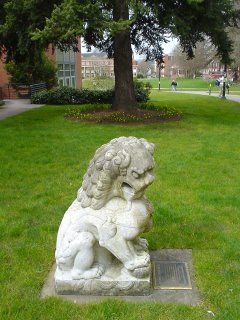
zur gemütlichen einstimmung auf meinen blog gibt es frühlingshafte impressionen vom campus...das gute an meinem job (ich bin parkplatzwächter und muss aufpassen, dass sich ja keine verdächtigen personen auf dem von mir überwachten territorium herumtreiben) ist, dass ich jede menge zeit habe die natur zu beobachten.
mehr fotos werden also folgen (die kirschbäume müssten bald zu blühen beginnen... ;-)
für alle, die sich fragen was es mit den "bearcats" auf sich hat: der marderbär ist das offizielle maskottchen der uni (wahrscheinlich war der bearcat im uni-gründungsjahr 1842 das aufregendste tier der ganzen westküste) und somit sind alle sportteams hier nach ihm benannt. bearcats sind nachtaktiv und verbringen die meiste zeit auf bäumen. sie gehören zur gruppe der schleichkatzen, ernähren sich hauptsächlich von früchten und sollen sehr zutraulich sein. darum war es auch ein leichtes, sie von ihrem ursprünglichen lebensraum (südostasien) in den pazifischen nordwesten zu entführen. das feucht-warme klima hier empfinden sie als angenehm. in diesem sinne: go bearcats!
Wednesday, March 22, 2006
spät aber doch!

ein blog! ja, ihr staunt zurecht. sachen gibts! und die kritik ist berechtigt: da steht ein jahr lang eine stümperhafte seite im netz und weniger als 2 monate vor der heimreise PLÖTZLICH ein blog, als ob das jemanden interessieren würde. naja wartet ab.
springbreak steht bevor und so werde ich von samstag bis samstag (25. märz bis 1.april) in san francisco sein. nicht alleine, sondern mit dominik (augsburg), julia (ecuador), verena (salzburg), mans (schweden), mike und lee (beide england). mal schauen wen wir sonst noch so treffen. auf jeden fall gibts fotos und geschichten UND politikwissenschaftliches. letzteres wird ein wichtiges element auf meiner blog-page sein. "gähn", sagt ihr - "yipee", sage ich. zwecks sprache: ich werde den einen oder anderen eintrag auch auf englisch veröffentlichen, sollen ja nicht nur meine österreichischen freunde von meinem unermesslichen (oder war es: unermässlich? ha, scherz.) wissen profitieren. wissen, das ich mir kaffee trinkend und zeitung lesend am wunderschönen millstream aneigne. tag und nacht, versteht sich.






